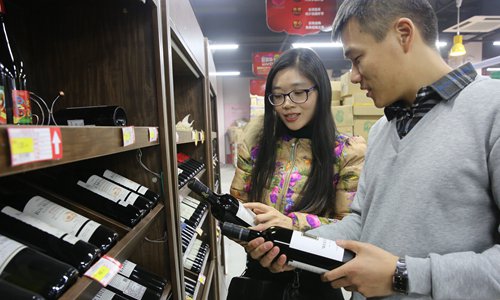China may reduce imports from Australia
By GT staff reporters Source:Global Times Published: 2020/4/28 22:08:41
Customers say worsening relations to dent demand for beef, wine

Consumers choose Australian wine at a shopping center in Qingdao Free Trade Port, East China's Shandong Province. Photo: IC
Chinese beef and wine buyers have warned that imports of Australian products to China may drop if bilateral relations worsen, after Australian Prime Minister Scott Morrison said that he would support an independent inquiry into the coronavirus pandemic.
Chinese Ambassador to Australia Cheng Jingye has denounced Morrison's push as "dangerous" because "the Chinese public is frustrated, dismayed and disappointed with what Australia is doing now," Cheng told the Australian Financial Review.
If the Australian government keeps taking unfriendly actions, the market share of Australian beef in China would certainly decline, a Chinese beef importer told the Global Times on Tuesday, noting that bilateral relations play a role in international trade.
"If the Australian government keeps unfriendly toward China, Australian beef's market share in China, which has already seen a significant decrease, will continue to drop," said Fu Denghu, general manager of Haiyunda Trading, which focuses on beef imports.
Australian beef's market share in China has dropped over 50 percent since 2015 as the Belt and Road Initiative delivered more import sources available to China, Fu said, adding he has lowered the amount of Australian beef imports in recent years. He said that unfriendly actions by the Australian government against China in the past two to three years had contributed to the decreasing market share in China.
China surpassed Japan and US as Australia's largest beef customer in 2019, importing 300,132 tons last year, accounting for 24.4 percent of all Australian beef exports.
Australian wine producers also rely on Chinese market. China has been a major destination for Australian wine since the two governments signed the Free Trade Agreement (FTA) in 2015. After 2019, when the tariff fell to zero, Australia eclipsed France as the No.1 wine source by value while Chile is No.1 by volume, according to Wine Australia, the country's wine regulator.
However, Long Guanyu, a Chinese wine dealer who imports Australian wine to China, told the Global Times that he was very worried about the sales drop of Australian wine in China.
"Unlike the auto industry, wine is highly replaceable. If Chinese customers choose to boycott Australian wine, they can easily find alternatives from France, Chile or South Africa," Long said.
A widespread boycott will certainly bring trouble to the Australian economy, as China accounted for more than one-third of Australian merchandise exports, including iron ore, coal, beef , wine and many other items, which created hundreds of thousands of jobs.
"Many small and medium-sized enterprises in Australia are working in the wine and beef industries and relying on Chinese buyers. The Australian government's words and deeds harm China, and at the same time hurts the interests of Australian businesses," Su Hao, founding director of the Center for Strategic and Peace Studies at the China Foreign Affairs University, told the Global Times on Tuesday.
This round of conflict may also affect Australia's coal exports to China, Liu Wensheng, deputy director of the ferrous metal department at First Futures, said. If bilateral relations worsen, China will restrict imports of Australian coal by limiting import quotas, Liu said.
Cheng warned of a loss of market confidence when he took the interview with the Australian newspaper. "It is up to the people to decide. Maybe ordinary people will say 'Why should we drink Australian wine? Eat Australian beef?'"
He also said that if sentiment worsens, Chinese people may hesitate to visit Australia or send their children to schools there.
A manager of a Chongqing-based education advisory agency surnamed Zhu told the Global Times that the number of Chinese applicants to Australian universities is down 50 percent year-on-year now, partly due to the fast-moving coronavirus that postponed many students' overseas study plans.
Some Chinese parents are concerned that certain Australian politicians' anti-China posture and racist rhetoric may result in discrimination against Chinese students in Australia. As a result, more Chinese parents shift to European universities instead, he said.
Refuting the so-called "economic coercion" cited by Australian Foreign Minister Marise Payne, Chinese Foreign Ministry spokesperson Geng Shuang said that the Chinese envoy's statement was about the dissatisfaction and concerns of Chinese people, triggered by false remarks from the Australian side.
"We hope that other countries can work with China to do things that benefit global cooperation and increasing mutual trust, instead of saying one thing and doing another," Geng said on Tuesday.
Posted in: INDUSTRIES